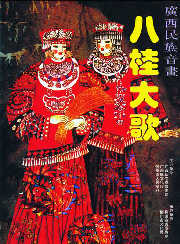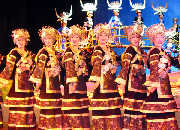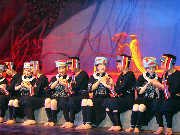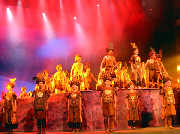|
 The Story of Play The Story of Play
 Liuzhou Song and Dance Troupe of Guangxi Zhuang Autonomous
Region Liuzhou Song and Dance Troupe of Guangxi Zhuang Autonomous
Region
|
Songs on Bagui, a large-scale song and dance gala dedicated to ethnic
minorities and their cultures, won the Wenhua Award issued by the Ministry of
Culture at the Seventh China Arts Festival. In addition, Zhang Jigang
won the Wenhua Award for Directing and Luo Jiangtao obtained the Wenhua
Award for Stage Art Design, with Du Ming and Fang Ming winning the Wenhua
Award for Composition. The play was also among the ten favorite plays
selected by the audience.
Bagui, alias of Southwest China's Guangxi
Zhuang Autonomous Region, boasts a large number of ethnic minorities as
well as a rich variety of songs and dances. This program collectively
displays the unique charm of the region.
This large-scale program is composed of two parts: Work and Love. The
program is neither a pure collection of folk songs nor a traditional song
and dance night performance, but rather a perfect combination of folk
songs with distinctive ethnic and modern flavors, dances and national
music instruments as well as ethnic costumes.
Zhang Jigang, the president of the Song and Dance Troupe of the
People's Liberation Army's (PLA's) General Political Department, is the
program's chief director. Fang Ming and Du Ming, two famous composers, are
respectively in charge of the compositions of the Work and Love sections.
Besides, the stage art's designer is Professor Luo Jiangtao of the Central
Theater Academy, while Wang Ruiguo, an expert lighting designer from the
National
Theater Company of China, designed the lighting.
Old, middle-aged and young lyrics writers from Guangxi created the more
than 30 original lyrics. All 700 costumes of the play is hand made by the
Long Hua from the Guangzhou
Military Region's Acrobatics
Troupe. With the joint efforts of leading artists, Songs on Bagui has been
honed as a repertoire of the region, vividly demonstrating the colorful
cultural phenomenon of the multiple ethnic groups including the Zhuang,
Dong, Miao and Yao.
As the only candidate for the Wenhua Award at the Seventh China Arts
Festival from Guangxi Zhuang Autonomous Region, so far the program has
been performed more than 70 times in front of a cumulative total of
100,000 spectators. The play debuted in Liuzhou
in April of 2003, and has since been performed in places including Nanning
(Guangxi's capital) and Zhengzhou
(capital of Central China's Henan
Province) as well as the Guangxi cities of Wuzhou and Guilin.
Guangxi's only other Wenhua Award was for the Singing King seven years
ago. |





